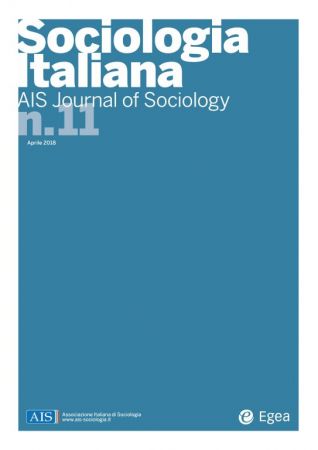AIS
2018/11
Basta che funzioni? Note su Big Data e teoria sociologica (Whatever works? Notes on Big Data and social theory), di L. Sabetta
L’avvento dei Big Data (e la loro vasta applicazione nello studio della realtà sociale) è stato occasione, fra le altre cose, per mettere pesantemente in discussione il ruolo della teoria nella ricerca sociologica. Il contributo cerca, anzitutto, di sottolineare l’inconsistenza di tale conflitto teoria/Big Data, evidenziando la natura eminentemente metodologica e procedurale di questi ultimi; rifacendosi alla distinzione mertoniana tra questioni tecniche di pertinenza operativa e problemi concettuali di natura teorica, si prova a mostrare come i Big Data non possano in nessun modo – da un punto di vista logico – sancire «la fine della teoria». Al contrario, nella seconda parte del contributo viene ricapitolata una tradizione sociologica esattamente opposta, che non solo vede nella fase teorica un momento importante del farsi della ricerca sociale, ma cerca anche di vincolarsi e «obbligarsi» ad essa, rendendola imprescindibile.
The importance of social theory in empirical research has been seriously challenged by the advent of Big Data and their massive application to the study of social reality. This essay aims to highlight, firstly, why the «Theory vs. Big Data» confrontation is meaningless, since the latter are primarily methodological/procedural in nature. Stressing the significance of the Mertonian distinction between substantive issues of theoretical relevance on one hand, and operative problems of methodology on the other, we wish to show how – from a logical point of view – the coming of Big Data will not mark «the end of theory» in any way. In the second part of the essay we therefore examine a specific (and quite different) sociological tradition: a distinctive approach that not only considers theory as a matter of crucial importance, but that also undertakes to develop top-level social theory.
Keywords: social theory, Big Data, methodology of social sciences, Robert K. Merton, analytical sociology, teoria sociologica, metodologia delle scienze sociali, Robert K.Merton, sociologia analitica
DOI: 10.1485/AIS_2018/11_3434232
Pagine 187-194
L'ACCESSO A QUESTO CONTENUTO E' RISERVATO AGLI UTENTI ABBONATI
Sei abbonato? Esegui l'accesso oppure abbonati.
